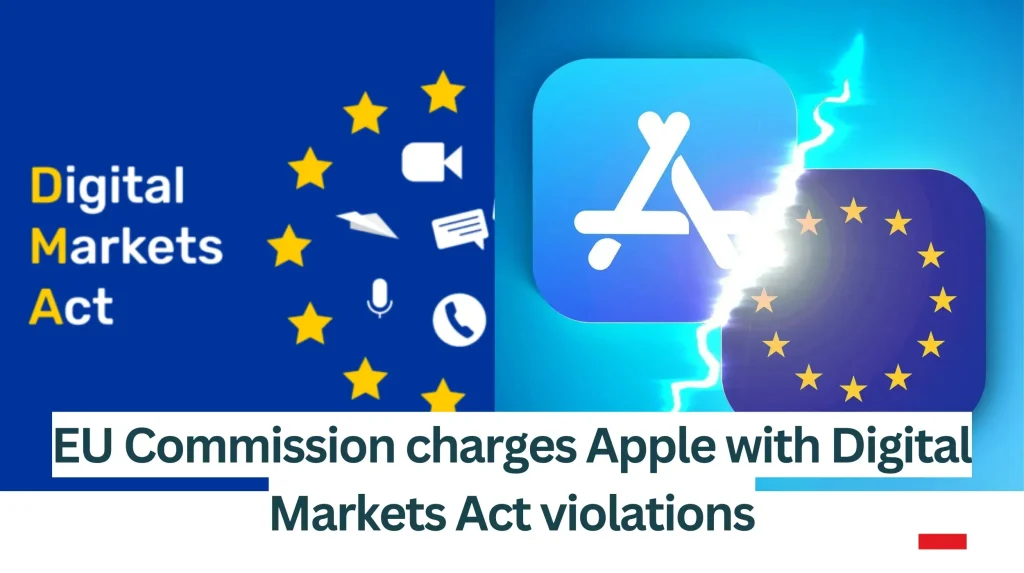The recent Apple Digital Markets Act violation has sent ripples through the tech industry, culminating in a hefty $568.6 million fine imposed by the European Union. This penalty comes in the wake of findings that Apple failed to adhere to the EU’s Digital Markets Act by obstructing app developers from promoting alternative payment methods outside of the Apple App Store. As mandated by the DMA, developers should be able to inform users about cheaper options, directing them towards favorable choices without facing commercial repercussions. However, Apple’s anti-steering obligations were compromised, forcing developers to funnel 30% of their revenue back to Apple, which led to this significant breach. With this ruling, the EU is firmly pushing for more transparent and competitive practices in digital marketplaces, encouraging fairer opportunities for developers and consumers alike.
In a groundbreaking ruling, the European Union has adopted a stern stance against Apple for its breach of regulations intended to facilitate competition in the digital market. This decision follows an investigation that identified Apple’s reluctance to allow app developers the freedom to promote alternative purchasing options outside its own ecosystem, which is critical for ensuring consumer choice. Notably, these restrictions against informing customers about external payment systems were found to violate the obligations outlined in the Digital Markets Act (DMA). As a result, a significant fine was levied against Apple, emphasizing the importance of compliance with anti-steering rules that aim to foster equitable market conditions. The EU’s emphasis on enforcing these guidelines not only impacts Apple but also signals a shift towards increased scrutiny for tech giants operating within Europe.
Understanding the EU Digital Markets Act and Its Impact on Apple
The Digital Markets Act (DMA) introduced by the European Union aims to create a fairer digital marketplace, ensuring that major tech companies like Apple do not monopolize the online services space. This regulation seeks to dismantle anti-competitive practices that hinder smaller players, particularly in app ecosystems where Apple holds a significant market share through its App Store. Apple’s violation of the DMA highlights the EU’s commitment to enforcing these rules, signaling to other tech giants that compliance is mandatory to promote innovation and competition.
The ramifications of the EU Digital Markets Act are vast, influencing not only how Apple interacts with app developers but also how consumers access and choose their digital services. By mandating that developers can directly inform consumers about alternative payment methods, the DMA aims to lower prices and enhance service offerings for end-users. Ultimately, this legislative move represents a pivotal moment in the ongoing battle between regulatory bodies and big tech companies, presenting a pathway toward increased transparency and fair competition.
Apple Digital Markets Act Violation: A Closer Look
Apple’s recent $568.6 million fine is a direct consequence of its breach of the Digital Markets Act, particularly concerning the restrictions it imposed on developers regarding alternative payment methods. By prohibiting app developers from linking to other payment options or even mentioning them, Apple effectively stifled competition, forcing developers to continue utilizing its App Store, which charges a hefty commission on transactions. This violation underlines the difficulties that developers face in a landscape dominated by a single tech giant.
The fine serves not only as a punitive measure but also as a strong reminder to Apple and other platforms of the serious implications of failing to comply with the DMA. The European Commission’s decision illustrates a broad commitment to uphold fair market practices, allowing for a dynamic ecosystem where developers can thrive. This ruling encourages transparency, enhancing user choice and potentially leading to more competitive pricing and service diversity within the app store landscape.
Apple’s App Store Payment Methods Under Scrutiny
The scrutiny surrounding Apple’s App Store payment methods stems from the company’s long-standing policy of restricting developers from using alternative payment systems. By enforcing its own payment processing, Apple not only secures a substantial 30% cut of transactions but also limits developers’ abilities to innovate in pricing strategies. This practice has drawn ire from both developers and regulators, as it is seen as an infringement on free market principles upheld by European laws.
Regulatory bodies are increasingly concerned that such restrictions limit consumers’ access to potentially lower-priced alternatives while empowering a monopolistic structure that harms competition. The EU’s efforts to address these issues through the DMA strive to dismantle the existing barriers that prevent developers from reaching consumers directly, ultimately fostering a more competitive environment in which more diverse payment methods can thrive.
Consequences for Apple: The Immediate and Long-Term Effects
The immediate consequence of the European Union’s ruling against Apple has been the imposition of a hefty fine, prompting the company to reassess its current policies surrounding app distribution and payment options. In the short term, Apple is likely to face increased scrutiny over its business practices, as regulatory bodies seek to ensure compliance with the DMA. This particular case sets a precedent that encourages regulators in other regions to examine Apple’s conduct closely, potentially leading to further fines and adjustments to business operations.
In the long term, Apple may need to pivot fundamentally in how it interacts with developers and, consequently, its business model. By adhering to the obligations set forth in the DMA, Apple could foster a more positive relationship with app developers, potentially leading to a wider variety of applications and services available on its platform. Additionally, enhancing consumer choice through diverse payment methods may ultimately bolster Apple’s reputation amidst growing regulatory challenges.
The Role of Anti-Steering Obligations in the DMA
Anti-steering obligations are a critical component of the Digital Markets Act, designed to prevent platforms like Apple’s from using their market power to unfairly disadvantage competitors. These obligations require that app developers can inform users about alternative payment methods outside of the App Store, thus ensuring users are not misled or constrained to only Apple’s payment system. The failure of Apple to comply with these obligations led to significant scrutiny and regulatory action.
This aspect of the DMA seeks to enhance the competitive landscape by ensuring that consumers are aware of different pricing options and alternatives. By violating these anti-steering obligations, Apple not only risks imposing higher costs on consumers but also impedes the broader potential for innovation and consumer choice in the app market. The ruling underscores the importance of these obligations in fostering a fairer digital economy where every player has an equal opportunity to succeed.
What Lies Ahead for Apple and App Developers
With the recent fine and the implications of the DMA violations, the future holds uncertain prospects for Apple and its relationship with developers. As regulatory pressures mount, Apple may be compelled to adjust its policies significantly, paving the way for developers to utilize alternative payment methods and better communicate with their user base regarding such options. This shift not only impacts Apple’s revenue model but could also lead to a more equitable market where innovation thrives.
For app developers, the ruling represents a watershed moment that may empower them to advocate for fairer business practices. By being able to navigate away from Apple’s payment constraints, developers could explore new revenue streams and pricing strategies that enhance market competition. This endeavor could foster a surge in app development and diversity, ultimately benefiting consumers with more choices and competitive pricing.
Analyzing the European Union’s Approach to Big Tech
The European Union’s aggressive stance on regulating big tech companies like Apple reflects a growing global trend aimed at curbing monopolistic practices. This approach is part of a larger framework of legislation designed to safeguard consumer rights and ensure fair competition in the digital landscape. By holding Apple accountable for its DMA violations, the EU underscores the necessity for regulation in an era where tech giants wield considerable influence over the digital economy.
The EU’s strategy emphasizes that compliance with consumer protection and competition laws is no longer optional for tech companies. Such a rigorous enforcement mechanism signals to the market that developers and consumers alike are entitled to a fair playing field. The EU’s framework could inspire similar strategies in other regions, ultimately leading to a more balanced landscape in technology and digital commerce.
Implications for Consumers in the App Market
Consumers are the ultimate beneficiaries of legislative measures like the Digital Markets Act, as these laws seek to create a competitive marketplace where users can access a wider variety of services. By allowing developers to freely inform customers about alternative payment methods, consumers could potentially enjoy lower prices and enhanced features that are currently hindered by the high costs associated with Apple’s imposed commissions.
The EU’s enforcement of the DMA not only aims to optimize user choice but also sparks the potential for innovation driven by competition. With the ability to bypass Apple’s Payment system, developers may create more diverse offerings tailored to consumer needs without the fear of exorbitant fees. As this legal landscape evolves, consumers stand to gain significantly from the increase in consumer-friendly practices and a more competitive app market.
The Future of Regulatory Actions in the Tech Industry
The European Union’s decision to fine Apple for its violations of the Digital Markets Act marks a pivotal moment in the ongoing evolution of regulatory actions in the tech industry. This ruling could prompt other countries to follow suit, leading to stricter regulations and oversight of big tech companies worldwide. Regulatory bodies might become more proactive in addressing monopolistic practices, ensuring that companies like Apple cannot undermine competition without accountability.
As tech giants adapt to this evolving regulatory environment, innovations may emerge that prioritize inclusivity and enhanced consumer experiences. The potential for increased transparency and fairness in how digital markets operate could shape the future dynamics of the technology sector. In encouraging compliance with regulatory mandates, there is an opportunity for a balanced ecosystem where both consumers and developers can thrive.
Frequently Asked Questions
What penalties has Apple faced for Digital Markets Act violations in the EU?
Apple has been fined $568.6 million (€500 million) by the European Union for violating the Digital Markets Act (DMA) due to restrictions on app developers regarding alternative payment methods in the App Store.
What are Apple’s anti-steering obligations under the Digital Markets Act?
Under the Digital Markets Act, Apple is required to allow developers to inform customers about alternative payment options outside the App Store. This means that developers should be able to guide users to cheaper alternatives without facing restrictions.
How does Apple’s violation of the Digital Markets Act affect developers?
Apple’s violations of the Digital Markets Act hinder developers from fully utilizing alternative distribution channels and communicating about cheaper payment options, which ultimately limits their revenue potential and consumer choice.
What are the implications of the EU Digital Markets Act for Apple’s App Store payment methods?
The EU Digital Markets Act mandates that Apple must allow developers to mention and link to alternative payment methods, thus disrupting its current practice of forcing a 30% revenue share from App Store transactions.
Has Apple made any changes following the Digital Markets Act ruling?
Yes, Apple updated its business terms in the EU to permit developers to link to external payment systems, but the European Commission found these changes insufficient to comply with its anti-steering obligations under the DMA.
Why did the EU impose a fine on Apple related to the Digital Markets Act?
The fine imposed on Apple for DMA breaches reflects the seriousness of its non-compliance and the duration it maintained restrictions that prevent developers from informing consumers about alternative payment options.
What actions must Apple take following the Digital Markets Act ruling?
Apple is required to remove technical and commercial restrictions on steering and ensure compliance with the Digital Markets Act regulations moving forward.
Are other companies facing similar penalties for Digital Markets Act violations?
Yes, other companies, like Meta, have also been fined for violations related to advertising and payment policies, indicating a broader enforcement of competitive regulations in the EU.
| Key Point | Details |
|---|---|
| EU Fine | Apple fined $568.6 million (€500 million) for violating Digital Markets Act. |
| Violation Details | Apple prohibited App Store apps from mentioning or linking to alternative payment methods, forcing 30% revenue to Apple. |
| Commission’s Findings | Apple restricts app developers from informing customers about external offers, violating user choice obligations. |
| Required Actions | Apple must eliminate technical and commercial restrictions and comply with the ruling going forward. |
| Similar Cases | Meta was fined $227.5 million for its advertising policy violations related to the DMA. |
| Previous Investigation | UK’s CMA closed its investigation focused on Apple’s in-app payment system in August. |
| Apple’s Response | Apple revised its EU business terms but it was insufficient to resolve the complaints. |
Summary
The Apple Digital Markets Act violation has resulted in a significant fine of $568.6 million due to the company’s failure to adhere to EU regulations regarding app distribution and payment methods. This breach occurred when Apple restricted developers from mentioning alternative payment options, compelling them to direct 30% of their earnings to the company. The European Commission emphasized the importance of user choice and mandated Apple to lift these restrictions to ensure compliance moving forward. This ruling not only highlights the EU’s strict enforcement of digital market regulations but also highlights the growing scrutiny over tech giants and their commercial practices.



